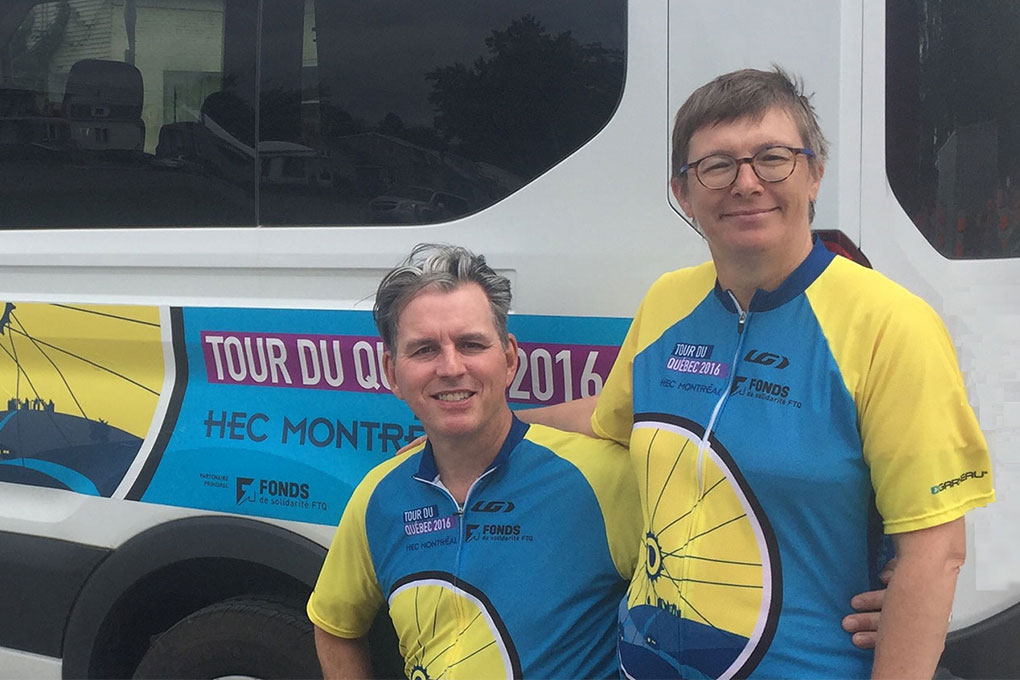Photo: courtesy of Brian King
“Neither Anne nor myself did a lot of cycling, admits Brian King, assistant professor at the HEC Montreal’s Department of Entrepreneurship and Innovation, but biking wasn't our goal. We wanted to find a way to add another dimension to business history. Having an in-depth knowledge of a business's past enables us to make better businesses for tomorrow.” By gaining a unique experience and remarkable encounters, he and Anne Pezet, professor at the Management Department, create a new way to teach future entrepreneurs.
The intensive course called Tour of Quebec: History and Development (Tour du Québec: histoire et développement) is a physical tour that leads students on bikes across Quebec roads in search of businesses and history of the local economy.
"What's better than being able to go out into the field? explains Brian King. Students have the opportunity to visit places that have made a mark on regional economic development, they can take advantage of these places to see entrepreneurs in the field, in their work environment, at the heart of the action.”
Seeing Quebec Inc.
The course of three intensive days in Montreal continues with nine days on the roads of Quebec (in 2015, students roamed the roads of Beauce; in 2016, the roads of Saguenay). It includes visits to historic sites, business visits as well as meetings with entrepreneurs, workers and managers.
For Brian King, who wanted to take students out of their comfort zone, this course is a little business in and of itself: the efforts of each person lead toward a common goal. “We suffer together. We make progress together. We make it together”, summarizes the professor.
“The bicycle trip is more than just a time for exercise, he adds, it's a period for reflection.” On a bike, there's no place for sleeping or texting. Students are concentrated on the effort and on the road. This is when they have all the time to think about what they've learned, the moment they’ve just experienced by visiting a business, the meetings that they’ve held and the regions they’ve discovered.
A World’s First
“There was no precedent for a business history course at the HEC, explains Mr. King.. However, history is everywhere. It allows us to learn a lot about who we are and what we can become. We had the idea to do something experimental to allow future entrepreneurs to get to the heart of the life and history of businesses in Quebec.” The historical aspect of this course, which breaks from the ordinary, is working quite well. “We discover the province at a very different pace from a traditional course in class. We follow the old railway routes, off the beaten path, cross through cities that were once industrial or mining, we stop in towns built on one economic activity, we better understand why and how businesses developed in relation to their resources, history, and geography.”
Teaching for many years, Brian King has learnt as much as his students. “It was a challenge to prepare and organize, he says. I had to find a way for this course to be different from the others. We knocked out a few regularities.”
The effort was worth the prize. Students enriched their understanding through a unique experience and HEC Montreal was awarded by the Association to Advance Collegiate Schools of Business for the creativity and innovation of this course. . “This has had without a doubt the biggest impact on my students, it's that it wasn't professors teaching the course, but entrepreneurs, workers and people in the field. They were struck by people's passion for business throughout the regions.”
What's more convincing than meeting people who have started their own business and going there to meet them? “You have to demonstrate a lot of passion and tenacity for these businesses to succeed, recaps the professor. The students received a real life lesson...”
